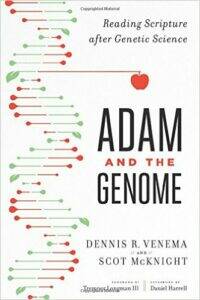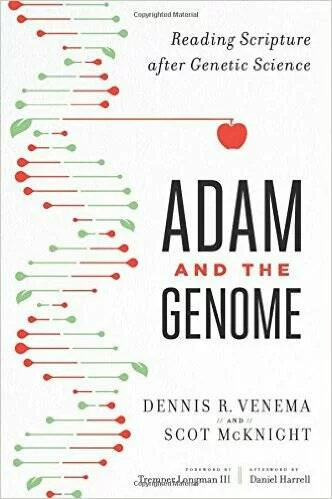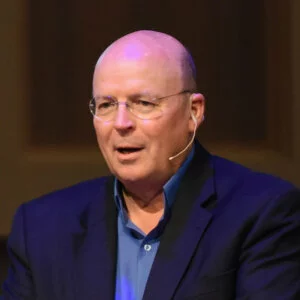Dennis and I were both honored and wary that the Creation Project would take on our book for a wider public discussion, honored because they chose our book and wary because it was a five-to-two ratio of reviews to responses and because we know that many in the evangelical community will agree with neither Dennis nor me.
A history of listening in on this discussion leads me also to wonder if genuine progress can be made. It is what it is and in this response I can offer only a few observations.
I begin with a confession because it is important to me: I am no longer interested in the discussion of whether the science at work in Dennis’ sections is accurate. Which is to say, long ago I embraced the rudiments of evolution as consistent with how God chose to create. I did not then nor do I now think theistic evolution, as it was then named but now (by some) called “evolutionary creationism,” necessarily entailed naturalism, anti-supernaturalism or randomness in the process. Neither Dennis nor I have ever described our view in simple terms as naturalism. But my point is larger: So while I have only a tangential interest in the evolution-as-accurate discussion, I am intensely interested in a more contextually sensitive reading of GenesisThose who want to debate the science can do so but I have crossed that threshold and am not likely to go back. The conclusions of Francis Collins (The Language of God), Denis Alexander (Creation of Evolution), John Polkinghorne (The Polkinghorne Reader), and others, not to ignore the marvelous history of evolution as told by Edward J. Larson (Evolution: The Remarkable History of a Scientific Theory), are compelling enough for me to move on. What I have moved on to is how to read Genesis in its ancient context. So while I have only a tangential interest in the evolution-as-accurate discussion, I am intensely interested in a more contextually sensitive reading of Genesis (and by Genesis I mean the bits in Genesis that concern creation and the human story).
Before I move on I raise an alarm: no one in the reviews seems to care about historical context, either the Ancient Near East or the Jewish world that was contemporary to the apostle Paul. There is not any serious interaction with what I spelled out in my chapters as crucial for understanding what the Bible says. This disappoints.
Scientific Concordism or Concording with Context?
Concordism seems to be a sticky subject for some. I got a letter yesterday from a well-known and conservative evangelical academic who told me in no uncertain terms that all forms of concordism are wrong. For him concordism is forcing the Bible into scientific theories, which he thinks over time will change and therefore impugn the interpretation of the Bible if not the Bible itself. Exactly, I said to myself. Hence, I want to pull out the definition of concordism in Zondervan’s new Encyclopedia of Christianity and Science, and I want to draw attention in this definition to what might be called the “prospective” knowledge of the concordist approach (which I put in italics):

Baker Academic (2017)
CONCORDISM. Concordism refers to the position that the teaching of the Bible on the natural world, properly interpreted, will agree with the teaching of science (when it properly understands the data), and may in fact supplement science. The concordist not only believes that nature and Scripture will harmonize, but sees specific references in the Bible to current scientific understanding of the universe. The concordist, then, looks for those close parallels in order to show that Scripture concords or agrees with scientific conclusions.
Concordism then is not simple agreement between Bible and science but the anticipation of science in the Bible because, as the next statement makes clear and with which I agree, the Bible is true:
Because the concordist holds Scripture as entirely truthful, there cannot be any ultimate contradiction between Scripture rightly interpreted and nature rightly interpreted. In both Scripture and nature, of course, there is the potential for error in the interpretation.
Again, notice the anticipation of current scientific theories already in the Bible:
Concordism, however, assumes that correlations can be made, believing in a degree of accuracy of interpretation (though not infallibility) in current science and in showing how Scripture supports clear scientific conclusions.
The author proceeds to mention the day-age theory, which was a bit of a storm center when I was a college student. Of course there are stronger and more moderate forms of concordism, and Denis Alexander at BioLogos detailed three kinds of concordism. (Denis may be right in a general sense but concordism in the USA seems to have taken on the meaning fleshed out in the Soden article I am discussing here.) The author of the concordism entry shows, furthermore, that Young Earth Creationists begin with the truthfulness of Scripture and use that to question science. But John Soden thinks there is an alternative:
An alternative view in the origins debate agrees that in the end science and Scripture will accord in what they affirm. However, this position believes that we are missing the point when we try to read Genesis in light of modern science or to interpret scientific data in light of Genesis.
This is what I believe, too, and so too what he says next:
Instead, we need to read the text in light of its ancient context for its original intent. In this view, the Genesis creation account does not affirm a position on modern scientific questions and so does not speak to the expected scientific issues directly (Miller and Soden 2012). Since Genesis 1 does not present scientific claims, such things as the age of the earth can be left to scientific investigation without needing to demonstrate specific correlation.
Concordism then is a position I eschew in my half of the book because I see it as mischievous or at least a happy moment of thinking what the ancients wrote just happens to be the same as the best of science teaches us today.
My own approach was not concordist in the least. However, I do understand why some might wonder if I went concordist in the other direction, namely, that I chose my reading of Adam and Eve because I was committed to the genome theory. Fair enough, but I’d like to explain. What happened was this: my reading of science, and I’m not a specialist, and my teaching of Genesis to college students, combined with a fiduciary relationship to my college science students, propelled me to work on Genesis and the ancient Near East (ANE) more seriously. Once I saw the probability of evolutionary theory I knew at least that concordist approaches needed reexamination, but—a strong “but”—it was that reexamination of the ANE sources that led me to conclusions not unlike those of John Walton at Wheaton (The Lost World of Genesis One).
What I like most about Walton is his careful examination of Genesis 1 in the context of the ANE creation stories. This reexamination of Genesis led me to do exactly what the counter-concordist discussion above said to do:I am convinced that far too many of our colleagues in the evangelical world are actually presuming on the Bible in light of what they know about science instead of letting the Bible be the Bible in its original context. “Instead, we need to read the text in light of its ancient context for its original intent.” What I find in the Bible is the absence of concord because the Bible is not using the categories of modern science. So while Bock’s point about general and special revelation is worthy of serious consideration, the ordering of the book does not map the ordering of my own thinking: Yes, science led me to the Bible but I want to contend that I have read the Bible in its context regardless of what science teaches. I am convinced that far too many of our colleagues in the evangelical world are actually presuming on the Bible in light of what they know about science instead of letting the Bible be the Bible in its original context. I hold up John Walton, among others (J. Richard Middleton, Peter Enns, John Polkinghorne), as a noble example though he and I would disagree on some points.
A brief point must be made: numerous reviewers say they don’t know science so they will focus on the Bible part of Adam and the Genome. I want to raise a red flag of caution here for in my experience, and throughout church history this has been the experience of many, it was science that awakened me to rethink how we are reading the Bible. What science can do is teach us that our interpretations of the Bible may need reconsideration. I don’t want to give the primacy to science, so I like how Bock speaks to this issue with clarity, but neither can we ignore the science, which is happening routinely in questions people ask me about Adam and the Genome.
Paul’s Use of Adam in its Ancient Jewish Context
I’d like to see more admission of the interlocking of factors at work when we speak of the “historical” Adam (and Eve is ignored in that discussion far too often). I detail that set of factors on pp. 107-108 and I don’t think we would be having this discussion were it not for that largely Augustinian understanding of the so-called “historical” Adam and Eve. I am convinced that Paul and the Jewish traditions that speak to this issue think of all humans as sinners and they do so because they see in humans actual sinning. I am not yet convinced we need bio-genetic transmission to claim that all of us sin, which we do, nor am I convinced Paul actually teaches that in Romans 5. Nor do I think we need to deny original sin just because Paul doesn’t teach it. Augustine clearly said more than Paul, but that doesn’t mean Augustine said too much.
I am not yet convinced we need bio-genetic transmission to claim that all of us sin, which we do, nor am I convinced Paul actually teaches that in Romans 5. Nor do I think we need to deny original sin just because Paul doesn’t teach it.
Which leads to this: any discussion of Adam and Eve in Romans 5, the central text in the whole discussion for Christian theology and soteriology, must be undertaken in context, and that means a sweeping understanding of how Adam and Eve were understood in the Jewish world prior to Paul. That world shows an amazing variety and plasticity in how Adam was understood and used—yes, used—for constructing theology. That set of texts, which has been studied intensively by several (Levison, Legarreta-Castillo), compels me to say Adam had a literary life: the Adam (and Eve) of Genesis 1–3 got new lives in a variety of settings, so much so that we at least need to consider those portraits when we read Romans 5. In the book I show that a couple of these ancient Jewish texts saw Adam and Eve in “real” terms while others simply do not show their hand. I presume that all of them knew of Adam and Eve because of Genesis and took them to be the font of humanity, but I also conclude they knew that because they believed Genesis to be true. Apart from explicit statements by the various authors, including Paul, I think it is wise for us to not know if the authors believe in a real Adam and Eve unless they say so. Some will think this is too cautious, and I respect their pushback.
What shocks me is that those who claim creation involved the creation of two solitary individuals—and I see no reason to question that Genesis 1–2 depicts creation in that way—are the ones who create the most problems for a high view of Scripture. IF one thinks the original creation involved two solitary, and only two individuals, Adam and Eve, created specially and directly out of nothing and from whom all humans descend and IF the genome theory is accurate, THEN the Bible is wrong. In which case the irony is that those who are fighting for inerrancy make the Bible errant, while those who are accused of errancy have the rightful claim to inerrancy. There is a better way to read the Bible’s passages about Adam and Eve, and its concord is with the ancient Near East.







Comments
Be the first one to make a comment!